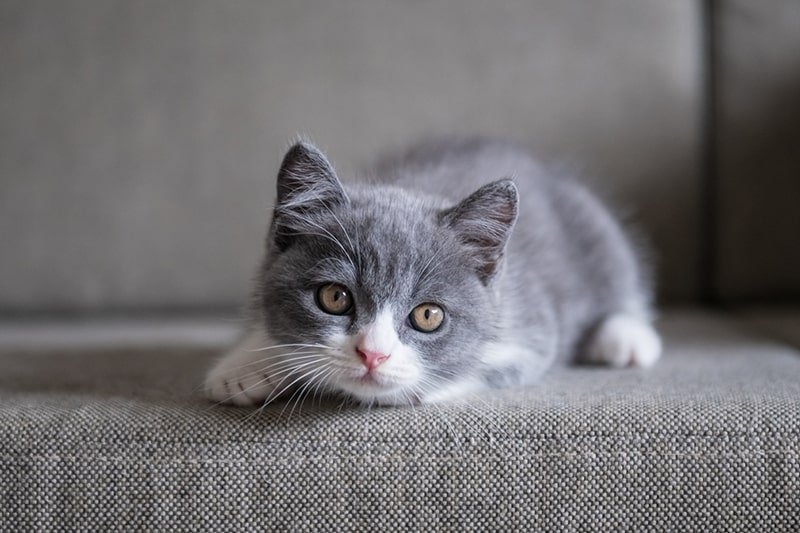British Shorthair kitten behavior problems can be puzzling for new cat owners. Although these kittens are known for their calm and affectionate nature, they may occasionally display behavioral challenges such as biting, scratching, excessive meowing, or litter box issues. Fortunately, by identifying these issues early, owners can raise a happy and well-adjusted feline companion.
In this informative guide, we explore common British Shorthair kitten behavior problems and explain how to fix them using practical, effective methods. By understanding your kitten’s behavior and applying consistent strategies, you can prevent small issues from becoming lifelong habits.

Common British Shorthair Kitten Behavior Problems
Although British Shorthairs generally exhibit a gentle temperament, their kittens sometimes develop frustrating habits. Therefore, let’s examine the most common issues and how to resolve them step by step.
1. Biting and Scratching
Biting and scratching represent two of the most frequent British Shorthair kitten behavior problems. Kittens usually bite or scratch during playtime or when they feel overstimulated. Over time, this can develop into persistent and unwanted behavior.
To resolve this, redirect your kitten’s attention by offering interactive toys rather than your hands. When the kitten bites, immediately end the interaction and walk away. This action teaches the kitten that biting results in a loss of attention. Consistently offer scratching posts and reward your kitten with praise when they use them appropriately.
2. Excessive Meowing
Despite their reputation for being quiet, some British Shorthair kittens meow excessively when they feel bored, anxious, or neglected.
To address this issue, ensure your kitten receives both mental and physical stimulation throughout the day. Use a mix of toys, play sessions, and gentle interaction to keep them engaged. If the meowing persists, consult your veterinarian to rule out any medical causes.
3. Litter Box Issues
Litter box avoidance often frustrates new cat owners. British Shorthair kittens may avoid the litter box due to cleanliness issues, poor placement, or medical discomfort.
To fix this, always keep the litter box clean and place it in a quiet, easily accessible area. If your kitten avoids the box, try experimenting with different litter types or box designs. If the issue continues, seek veterinary advice to rule out urinary tract infections or other health conditions.
4. Aggression Toward Other Pets
Introducing a British Shorthair kitten into a multi-pet household may initially trigger territorial behavior or fear-based aggression.
To ease tensions, introduce pets gradually in a controlled environment. Begin with scent-swapping and brief, supervised meetings to help them get familiar with each other. Eventually, they will develop mutual trust and tolerance.
5. Climbing and Jumping on Furniture
Even though British Shorthairs are not the most athletic breed, kittens still display bursts of curiosity that lead them to jump on countertops, tables, and shelves.
To prevent this, provide plenty of approved vertical spaces, such as cat trees or mounted shelves. Additionally, deter unwanted climbing by placing aluminum foil or double-sided tape on restricted surfaces. Maintain consistency to help reinforce boundaries.
6. Destructive Behavior from Boredom
When British Shorthair kittens feel understimulated, they often engage in destructive actions like chewing furniture or unraveling fabrics.
To correct this behavior, ensure daily interactive play sessions and rotate toys frequently. Introduce puzzle feeders and multiple types of scratching pads to offer both mental stimulation and a positive outlet for energy.
7. Separation Anxiety
British Shorthair kittens can experience anxiety when left alone for extended periods, especially after a recent rehoming.
To manage separation anxiety, establish a steady routine and create a secure, calming space filled with familiar items. Leaving a piece of clothing with your scent or playing soft background music can help ease the kitten’s distress.
8. Vocalization Due to Hunger or Attention Seeking
Your British Shorthair kitten may meow persistently around feeding times or when they want attention. Though endearing at first, this behavior can escalate if not addressed.
To solve this, feed your kitten on a consistent schedule and avoid rewarding every vocal demand with food. Offer affection when your kitten is calm to reinforce desirable behavior patterns.
9. Teething and Nipping
Teething is a common stage that causes kittens to nip at hands or household items to relieve gum discomfort.
To counter this, introduce kitten-safe chew toys and redirect their attention when nipping begins. Avoid encouraging play with your fingers, as this promotes inappropriate biting habits.
10. Scratching Furniture or Walls
Scratching is a natural behavior that can become troublesome indoors if left unmanaged.
To guide your kitten appropriately, offer multiple scratching posts in various textures and locations. Use catnip or feline pheromones to attract your kitten to the correct areas and reinforce positive behavior with praise.
Preventing British Shorthair Kitten Behavior Problems
Preventing behavioral issues in British Shorthair kittens requires a proactive and consistent approach. Therefore, you should begin training early by setting clear boundaries and sticking to them.
Always use positive reinforcement when your kitten behaves well. Regularly socializing them with people and other animals helps minimize fear and anxiety. Moreover, keeping a predictable routine helps your kitten feel secure and calm. Rotate toys to maintain novelty and prevent boredom. Finally, ensure your kitten receives plenty of play and physical activity daily to burn off excess energy.
When to Seek Professional Help
If British Shorthair kitten behavior problems persist despite your efforts, you should consult a veterinarian or feline behaviorist. Persistent aggression, intense fear reactions, or ongoing litter box avoidance may indicate deeper health or emotional issues that require expert evaluation.
Final Thoughts: British Shorthair Kitten Behavior Problems
British Shorthair kitten behavior problems often stem from natural developmental stages or unmet physical and emotional needs. However, by applying consistent training methods, offering adequate stimulation, and maintaining a calm environment, you can effectively manage and even prevent these behaviors.
In conclusion, by addressing issues early and using a positive, structured approach, you will help your kitten grow into the affectionate, well-mannered cat the British Shorthair breed is loved for. Ultimately, this leads to a more harmonious home and a stronger bond between you and your feline companion.

